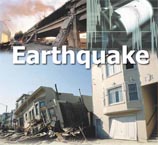Italy earthquake toll reaches 278
 Rome - Three days after an earthquake struck central Italy the death toll on Thursday rose to 278 as preparations got under way for a state funeral planned for Friday.
Rome - Three days after an earthquake struck central Italy the death toll on Thursday rose to 278 as preparations got under way for a state funeral planned for Friday.
Among the dead pulled from rubble overnight was a 20-year-old student trapped when a university dormitory building collapsed in the city of L'Aquila.
The body of the student, who was also the father of a 7-month-old baby girl, was taken to a police training school barracks situated in the city which is serving as an impromptu morgue.
Vatican Secretary of State Cardinal Tarcisio Bertone, the Holy See's second highest official, is set to preside over funeral rites set for Good Friday at the barracks, authorities said.
Pope Benedict XVI, who on Thursday began leading Holy Week ceremonies in Rome, has said he plans to visit the earthquake area "as soon as possible"
Efforts to find survivors will continue through Sunday, Prime Minister Silvio Berlusconi said during a visit to L'Aquila on Wednesday afternoon.
Rescuers, often with just their bare hands, are continuing to sift through smashed masonry and other debris in the hilly terrain on which l'Aquila and some of the other badly damaged towns were built.
The task is being made even more dangerous by dozens of powerful aftershocks that have followed the main earthquake. Monday's tremor registered around 6.2 on the Richter scale.
With many homes left abandoned the government said it was stepping up police and military patrols in the damaged areas to prevent looting.
Some 17,000 people spent Wednesday night housed in several tent camps set up by authorities as shelters mainly for residents of the worst hit areas including L'Aquila's city centre and the towns of Onna and Paganica.
The government says that reconstruction costs will rise to 1.2 billion euros (1.6 billion dollars) and entire towns will have to be rebuilt.
Monday's earthquake was the deadliest to hit Italy in almost 30 years.
In 1980 up to 3,000 people are estimated to have died in an earthquake in the souther Campania and Basilicata regions. (dpa)